ABS and KRISO Partner on Small Modular Nuclear Reactors
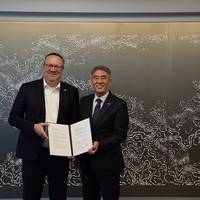
ABS and the Korea Research Institute of Ships & Ocean Engineering (KRISO) signed a memorandum of understanding (MOU) to cooperate on the application of small modular reactors (SMRs) in the marine and offshore sectors.The agreement establishes a framework for both organizations to exchange information and engage in joint research projects related to concept designs for an SMR-powered ship and a floating SMR power generation platform. Among the objectives are identifying and developing applicable regulatory guidelines and international standards.“Nuclear energy offers unmatched energy density…
Safeguarding Security on Nuclear-Powered Ships

No civilian maritime nuclear facilities have been commissioned in over four decades, but there’s been three major reports released this month on their future potential.DNV’s latest report, Maritime nuclear propulsion: Technologies, commercial viability, and regulatory challenges for nuclear-powered vessels, provides a regulatory perspective on security, one of the key challenges for future adoption. As it says: Safety, security and non-proliferation remain paramount. Future installations must be designed to withstand collisions, groundings, and external threats such as sabotage or piracy.
MIT Maritime Consortium Releases Nuclear Ship Safety Handbook
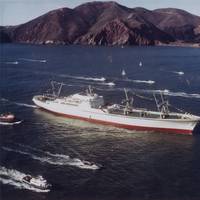
A new “Nuclear Ship Safety Handbook” by the MIT Maritime Consortium aims to set the standard for safe maritime nuclear propulsion.Using research data and standards, combined with operational experiences during civilian maritime nuclear operations, the handbook provides unique insights into potential issues and resolutions in the design efficacy of maritime nuclear operations, a topic of growing importance on the national and international stage.The handbook, which is divided into…
HD KSOE Gets DNV’s Blessing for Nuclear-Powered Container Ship Design
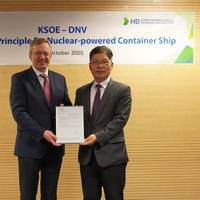
Classification society DNV has awarded HD Korea Shipbuilding & Offshore Engineering (HD KSOE) an Approval in Principle (AiP) for a new 15,000 TEU container vessel design powered by Small Modular Reactor (SMR) technology.The design demonstrates the application of SMR technology in a 15,000 TEU container vessel, capable of operating at 24 knots.The vessel concept incorporates a supercritical CO2-based power generation system, which can provide higher thermal efficiency and a reduced…
Nuclear-Powered Ships on Distant Course to Net-Zero Horizon, DNV Finds
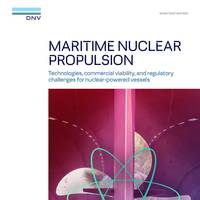
Growing environmental pressures are reviving interest in nuclear propulsion as a potential long-term route to decarbonize shipping, DNV said in a new paper, despite there being no civilian nuclear-powered vessels built for more than four decades.DNV’s latest report, Maritime nuclear propulsion: Technologies, commercial viability, and regulatory challenges for nuclear-powered vessels, highlights how maritime nuclear technologies differ from land-based reactors, and emphasizes the need to address technological…
Navigating Nuclear Energy in Maritime with Lloyd’s Register at Helm
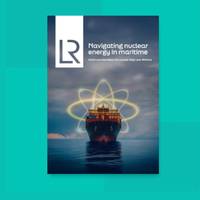
Lloyd’s Register (LR) has published a new guidance document, providing the first roadmap for the safe and responsible use of nuclear technology in commercial shipping and offshore industries.As the maritime sector accelerates its transition towards sustainable energy solutions, nuclear power has re-emerged as a viable solution to achieve net-zero ambitions. The guidance, Navigating Nuclear Energy in Maritime, was developed in partnership with Global Nuclear Security Partners (GNSP) and marine insurer NorthStandard.It sets out the practical steps project teams must take…
Rolls-Royce Signs Skills Agreements in Support of AUKUS

Rolls-Royce has signed memorandums of understanding (MOUs) with both Western and South Australian governments that outline a commitment to collaborate on workforce development, skills training, and critical technologies to support the growing defence sectors in each state.This marks a significant step forward in Australian preparations for the AUKUS submarine program which will provide the nation with their first conventionally armed nuclear navy.Under the agreements, both governments…
ABB, Blykalla Join Forces for Nuclear Power Tech for Maritime Industry
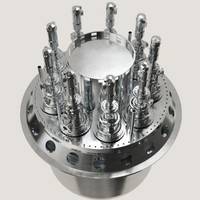
ABB has signed a memorandum of understanding (MoU) with Swedish nuclear energy company Blykalla to support and accelerate the deployment of small modular lead-cooled reactors to the maritime industry.Building on the terms of an existing MoU between Blykalla and ABB signed in October 2024, which targets developing lead-cooled SMR technology to support Sweden’s clean energy requirements, the agreement expands the partnership and aligns with growing momentum for nuclear energy as a marine power source.Blykalla’s Swedish Advanced Lead Reactor (SEALER) is a highly compact…
Op/Ed: Public Opinion on Nuclear Power has Deep Roots

Australia does not have nuclear power stations, and it does not have nuclear weapons.I remember having lessons and debates on it in high school, many years ago. My favorite science teacher was dead against either use of nuclear technology.One of the most interesting arguments I remember hearing was that the technology developments that make nuclear power more efficient would also help make nuclear bombs more efficient.Fiji is much the same as Australia, and it has even ratified the Treaty on the Prohibition of Nuclear Weapons…
LNG Carrier with Nuclear Propulsion Offers Faster Zero-Emission Transits, ABS Finds
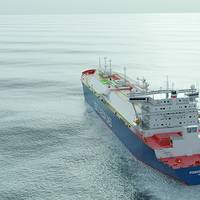
American Bureau of Shipping (ABS) has released its latest report into the potential of advanced nuclear technology for maritime applications, concluding the technology installed on LNG carrier would enable faster transit speeds with zero-emission operations.ABS conducted a study of a small modular reactor on a standard liquefied natural gas (LNG) carrier.The transformational impact of a high-temperature, gas-cooled reactor (HTGR) on the design, operation and emissions of a 145…












